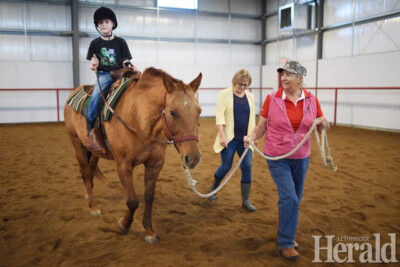Research shows benefits of therapeutic riding
By Al Beeber - Lethbridge Herald on June 27, 2024.
 Herald file photo
A young rider is led by helpers during a session at the Lethbridge Therapeutic Riding Association. Research shows that therapies such as those offered by the local organization have real benefits to people who take part in their programs.
Herald file photo
A young rider is led by helpers during a session at the Lethbridge Therapeutic Riding Association. Research shows that therapies such as those offered by the local organization have real benefits to people who take part in their programs.LETHBRIDGE HERALDabeeber@lethbridgeherald.com
Research shows that therapies such as those offered by the Lethbridge Therapeutic Riding Association have real benefits to people who take part in their programs.
Amanda Ervin, Executive Director of the Alberta Therapeutic Recreation Association, recently completed research at the University of Lethbridge that focused on the impact of adapted recreation on wellbeing and health.
Her thesis was called “Measuring Health Quality of Life, Wellbeing and Social and Personal Relationship Outcomes through Participation in Adapted Recreation.”
A research article based on Ervin’s work will be presented at the North American Federation of Adapted Physical Activity symposium in New York in September as well as the academic journal Palaestra
Her research shows that there is evidence therapies offered by adapted recreation provides benefits to recipients.
Ervin’s former thesis supervisor at the University of Lethbridge asked if she’d be interested in assisting what could be done at the riding association and “it ended up becoming a huge part of my thesis so I was able to take the lead on that really try to find the true benefits the riders are experiencing when they’re doing therapeutic riding,” said Ervin in a phone interview this week.
Ervin, who is also vice-president of the LTRA’s board of directors, says “there is something magical when riders are with a horse. It’s such a healing animal and there’s something very special about being on the farm itself.
“There’s a lot of research that supports this idea that being out on the farm, and the smells and the sounds of being outdoors really adds to the benefit of the experience for people,” said Ervin, who called the work at LTRA “a group effort.”
Ervin said the research means a lot to her being a therapeutic recreation professional for a long time.
“We always talk about the benefits that people experience. For me to be able to quantify some of these outcomes is really important. I hope that a lot of other organizations that are offering recreation therapy and some adapted recreation and therapeutic riding that they can access more funding and acknowledgement in their communities, as well, because we have some proof that these programs are making a huge impact in the health and wellbeing of these people receiving these services,” added Ervin.
The cohort Ervin worked with on the research comprised a wide range of ages from youth to older adults.
“Therapeutic riding is definitely valuable across the lifespan and I had the privilege of working with individuals with a number of physical and cognitive limitations. When we look at the research I conducted, I didn’t look at one specific diagnosis or one specific health-related concern, but we saw benefit in these folks no matter what physical or mental limitations they were living with,” added Ervin.
“That’s why we can say this therapeutic riding was effective for folks no matter their age or no matter the limitations or challenges that they’re arriving with on the farm,” said Ervin.
“I fervently hope that the findings and insights garnered from this work will positively impact the field, potentially reshaping practices, enhancing interventions, and ultimately improving the lives of individuals engaged in therapeutic recreation and adapted recreation programs,” says Ervin.
16-15


